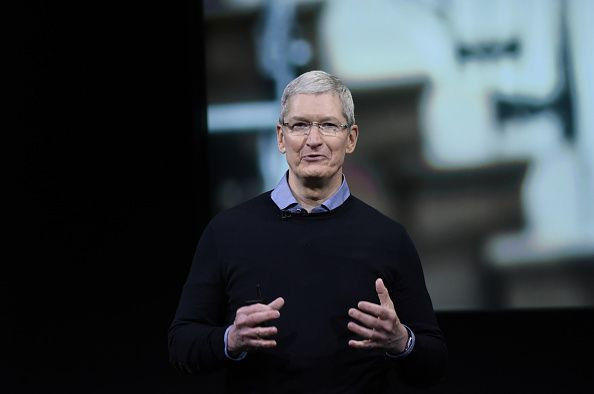Apple Inc. Makes The Case For Smaller iPhone And Greater Need For Privacy

UPDATE: 8:07 p.m. EDT -- A federal court in California has approved a request to postpone a scheduled Tuesday hearing in a high-profile case between the Department of Justice and Apple. The DOJ filed the request for the delay Monday, less than 24 hours before lawyers for the two sides were scheduled to appear before a federal judge in Riverside, California.
UPDATE: 7:45 p.m. EDT -- The Justice Department has requested a postponement of Tuesday's scheduled hearing in Riverside, California, on the Apple-FBI encryption dispute.
Original story:
For Apple, the star of its show Monday wasn’t a 4-inch iPhone SE. Nor was it the smaller iPad Pro. Instead, it was the company’s commitment to the privacy of its customers that was paramount — namely because the smartphone has become such an integral part of everyday life.
“We built the iPhone for you — our customers," Apple CEO Tim Cook said onstage in Cupertino, California. "And we know that it is a deeply personal device. For many of us, the iPhone is an extension of ourselves.”
That's but one of the many reasons Apple is battling the FBI in court over an order that could force it to create a backdoor into its iPhone, including one used by one of the San Bernardino, California, killers, Syed Rizwan Farook. Apple is scheduled to face the FBI in a court hearing on Tuesday.
But Apple didn't beat the audience over the head with the point. Instead, the company in a series of subtle nudges reminded us why it values privacy so greatly.
So in addition to unveiling a $399 iPhone, which will make Apple's secure ecosystem available to more entry-level users around the globe, Apple unveiled yet more features that show why privacy is so important.
Take CareKit for instance: it's a new way for customers to share their health data with their doctors. The software framework on its surface sounds fairly simple — developers can build apps using CareKit, which then allows its users to keep track of their symptoms. And when patients choose to, they can also share that detailed data with their doctors. While CareKit apps can enable developers to gain intimate data, Apple didn’t shy away from reminding viewers that they put the privacy of its users first and that only its customers could choose to share the data from their device.
“Apple has the strength to lead with personal identifiable information that’s stored away and locked in your phone,” said Johnny Won, managing partner at mobile consultancy Hyperstop. “And [Carekit is] something natural Apple can point to about how personal some of these pieces of information on our phones can be.”
With Apple’s devices, its hand was more subtle. At center of Apple’s iOS devices is encryption technology that the government couldn't break into. And with the cheaper iPhone SE, Apple just made that same strong encryption available to even more customers — especially those who would consider switching from Android devices.
“The iPhone SE was basically a 6S in a smaller form-factor and a lower price,” said Roger Entner, principal analyst at telecom consultancy Recon Analytics. “This lets Apple attack Android providers and target budget-conscious users at a lower price point.”
Apple did the same with its 9.7-inch iPad Pro, making it $599 — $200 less than the 12.9-inch iPad Pro. It’s a price that may be easier to swallow for customers looking to upgrade their aging iPads. But if they take the bait, they also benefit from the privacy and encryption features of the company's newer iPads.
Apple’s doubling-down on privacy as a selling-point comes on the eve of oral arguments in federal district court in Riverside, California. At the center of the case is whether the FBI overstepped its bounds when it ordered the company to create software to weaken the security of the iPhone.
While Apple maintains that this was the case, the FBI argues that it has the power to compel the company through a 227-year-old law called the All Writs Act. However U.S. magistrate judge Sheri Pym rules on the case, the losing party is expected to appeal.
© Copyright IBTimes 2025. All rights reserved.





















